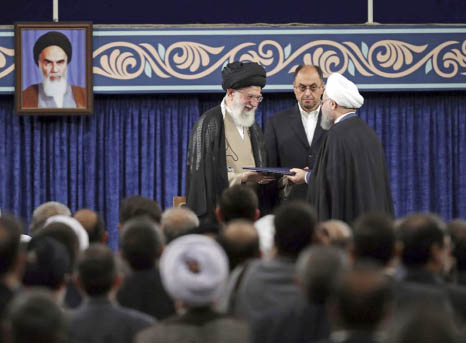
AFP, Tehran :
Iran said on Thursday that new US sanctions were a violation of its nuclear deal with world powers, piling pressure on President Hassan Rouhani as he started his second term.
Rouhani vowed to continue his efforts to end the country’s isolation as he was sworn in by supreme leader Ayatollah Ali Khamenei following his re-election in May.
But the ceremony came less than 24 hours after US President Donald Trump confirmed fresh sanctions against Iran.
Tehran says the new measures violate its 2015 deal with world powers that eased sanctions in exchange for curbs on its nuclear programme, an agreement which Trump has repeatedly threatened to tear up.
“We believe that the nuclear deal has been violated and we will react appropriately,” deputy foreign minister Abbas Araghchi said on state television.
“We will certainly not fall into the trap of US policy and Trump, and our reaction will be very carefully considered.”
The mounting crisis creates a difficult position for Rouhani, a 68-year-old moderate who won re-election largely thanks to his efforts to repair relations with the West.
“We will never accept isolation,” Rouhani said as he was sworn in in front of top political and military officials.
“The nuclear deal is a sign of Iran’s goodwill on the international stage,” he added. Khamenei took a tougher line, saying Iran must not fall for Washington’s “tricks”.
“The enemy’s hostility has made us more resistant,” he said.
Iranian officials say they have prepared a 16-point document for how they will respond to the new sanctions, without giving details.
The new parliament will also vote on a bill boosting financial support to the Revolutionary Guards and missile programme, which are targeted by the sanctions.
For Rouhani, who had hoped his second term would focus on rebuilding the stagnant economy, “it’s unfortunate timing,” said Ellie Geranmayeh, an Iran analyst with the European Council on Foreign Relations.
“What will be absolutely critical is how the Europeans position themselves,” she said.
Britain, France and Germany-who signed the deal alongside Russia, China and the United States-remain firm backers of the agreement and are eagerly seeking to rebuild trade ties with Iran, despite logistical problems caused by US sanctions.
French energy giant Total defied US pressure in July by signing a multi-billion-dollar gas deal with Iran.
“What Iranians are banking on at the moment, maybe overestimating, is that Europe will safeguard and build on the deal, and make it too politically costly for Trump to tear it up, or at least show Washington that if it walks away, it will be doing so alone,” said Geranmayeh.
The International Atomic Energy Agency has repeatedly certified that Iran is sticking by its commitments under the agreement-a position that has been reluctantly accepted by the Trump White House.
But with Iran gaining the upper hand across the Middle East, through its support for proxies in Syria, Lebanon and Iraq, US lawmakers appear determined to ratchet up tensions.
Rouhani also faces challenges at home.
Iran said on Thursday that new US sanctions were a violation of its nuclear deal with world powers, piling pressure on President Hassan Rouhani as he started his second term.
Rouhani vowed to continue his efforts to end the country’s isolation as he was sworn in by supreme leader Ayatollah Ali Khamenei following his re-election in May.
But the ceremony came less than 24 hours after US President Donald Trump confirmed fresh sanctions against Iran.
Tehran says the new measures violate its 2015 deal with world powers that eased sanctions in exchange for curbs on its nuclear programme, an agreement which Trump has repeatedly threatened to tear up.
“We believe that the nuclear deal has been violated and we will react appropriately,” deputy foreign minister Abbas Araghchi said on state television.
“We will certainly not fall into the trap of US policy and Trump, and our reaction will be very carefully considered.”
The mounting crisis creates a difficult position for Rouhani, a 68-year-old moderate who won re-election largely thanks to his efforts to repair relations with the West.
“We will never accept isolation,” Rouhani said as he was sworn in in front of top political and military officials.
“The nuclear deal is a sign of Iran’s goodwill on the international stage,” he added. Khamenei took a tougher line, saying Iran must not fall for Washington’s “tricks”.
“The enemy’s hostility has made us more resistant,” he said.
Iranian officials say they have prepared a 16-point document for how they will respond to the new sanctions, without giving details.
The new parliament will also vote on a bill boosting financial support to the Revolutionary Guards and missile programme, which are targeted by the sanctions.
For Rouhani, who had hoped his second term would focus on rebuilding the stagnant economy, “it’s unfortunate timing,” said Ellie Geranmayeh, an Iran analyst with the European Council on Foreign Relations.
“What will be absolutely critical is how the Europeans position themselves,” she said.
Britain, France and Germany-who signed the deal alongside Russia, China and the United States-remain firm backers of the agreement and are eagerly seeking to rebuild trade ties with Iran, despite logistical problems caused by US sanctions.
French energy giant Total defied US pressure in July by signing a multi-billion-dollar gas deal with Iran.
“What Iranians are banking on at the moment, maybe overestimating, is that Europe will safeguard and build on the deal, and make it too politically costly for Trump to tear it up, or at least show Washington that if it walks away, it will be doing so alone,” said Geranmayeh.
The International Atomic Energy Agency has repeatedly certified that Iran is sticking by its commitments under the agreement-a position that has been reluctantly accepted by the Trump White House.
But with Iran gaining the upper hand across the Middle East, through its support for proxies in Syria, Lebanon and Iraq, US lawmakers appear determined to ratchet up tensions.
Rouhani also faces challenges at home.

